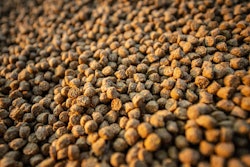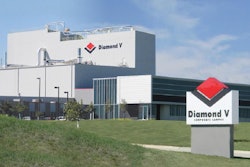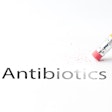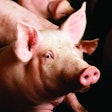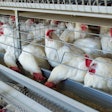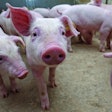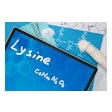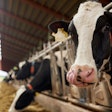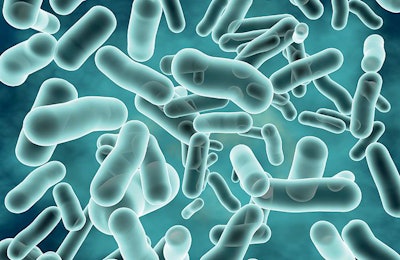
Adisseo and Novozymes introduce a new product for poultry intestinal health with a revolutionary process.
A new probiotic product for poultry improves intestinal health of commercial poultry, which then will benefit overall poultry performance and welfare.
Alterion, recently introduced by Adisseo and Novozymes, is a new probiotic product and, for the first time in the industry, its activity and determination can be visualized and demonstrated in vivo.
Germination is key
Alterion is delivered in spore form, that is, it is inactive. This is a big advantage because it provides stability in the feed. It survives thermal processes, like pelleting, long storage times and transportation, as well as the fact of being together with other feed additives.
Spores are very durable biological structures, but they need to come “alive.” Germination is the process of a seed or spore becoming active and developing. During this process, there is a cellular metabolism that restarts, which is crucial to allow the potential of an organism to be fully expressed.
Spores have specialized receptors in the inner membrane that detects nutritive compounds in the local environment, such as certain amino acids (L-alanine or L-valine) or carbohydrates (glucose or fructose), as well as temperature and moisture, for reactivation.
Germination of Bacillus-based probiotics, such as Alterion, in the animals’ gut is essential to provide benefits, such as improved gut health and performance.
“Once they come ‘alive’ in the gut, they can start dividing and multiplying and be metabolically active, producing several hundred metabolites,” said Karoline Sidelmann Brinch, science manager at Novozymes Applied Research, Animal Health and Nutrition.
Measuring germination
Measuring germination has not been an easy task, due to the complexity of the process and the microbiome of the host where it takes place. However, studies made by Novozymes and Adisseo have examined directly and indirectly the germination process of Alterion using a variety of methods.
The germination profiles can be evaluated in vivo with fluorescent markers integrated into the Alterion genome.
Germination in commercial chickens
Germination occurs at the jejunum, ileum and ceca in poultry. According to Damien Prévéraud, global technical and scientific manager health by nutrition at Adisseo, metabolites produced during germination of Bacillus are key in:
- Nutrient utilization
- Controlling inflammatory processes
- Restoring intestinal lesions
- Reinforcing the intestinal barrier
- Maintaining a healthy microbiota
- Decreasing pathogens and therefore infections
The metabolites produced – such as niacin, hypoxanthine or pantothenate – have a wide effect on reducing gut inflammation, increasing barrier function or restoring gut lesions. Ultimately, all these effects improve performance (increasing body weight gain, maintaining feed intake and decreasing feed conversion) and welfare.
Actions through lines of defense
Once germinated, Alterion acts through these three lines of defense:
- Resilient microbiota: Promotes beneficial bacteria through breaking down polysaccharides into oligosaccharides, degrading oligosaccharides to produce short-chain fatty acids such as butyrate, an energy source for enterocytes and an immune modulator. It also creates an unfavorable environment for the development of harmful bacteria, preventing dysbiosis, ensuring a balanced microbial ecosystem and resisting to challenges.
- Strengthened gut barrier: Prevents gut lesions, controls inflammation, limits pathogens and toxins passage which strengthens enterocytes, and increases the surface area to absorb nutrients.
- Controlled inflammatory response: The inflammation process produces compounds at the cell level that draws energy to the bird. Controlling the production of these compounds cause the bird to use this energy to grow and produce more muscle.
Better performance
Adisseo’s Prévéraud said a meta-analysis based on 11 performance trials carried out from 2014 to 2019, comparing antibiotic growth promoters (AGP) to Alterion (relative to a control) have shown a better body weight gain, lower feed conversion and equal feed intake.
Alterion is a good alternative to AGP. He concluded that this new product, whose research was done together with Ghent University in Belgium, showing an efficient germination, sustains animal’s resilience, improves gut health, performance and welfare and ensures a responsible use of medication for a sustainable animal farming industry.


